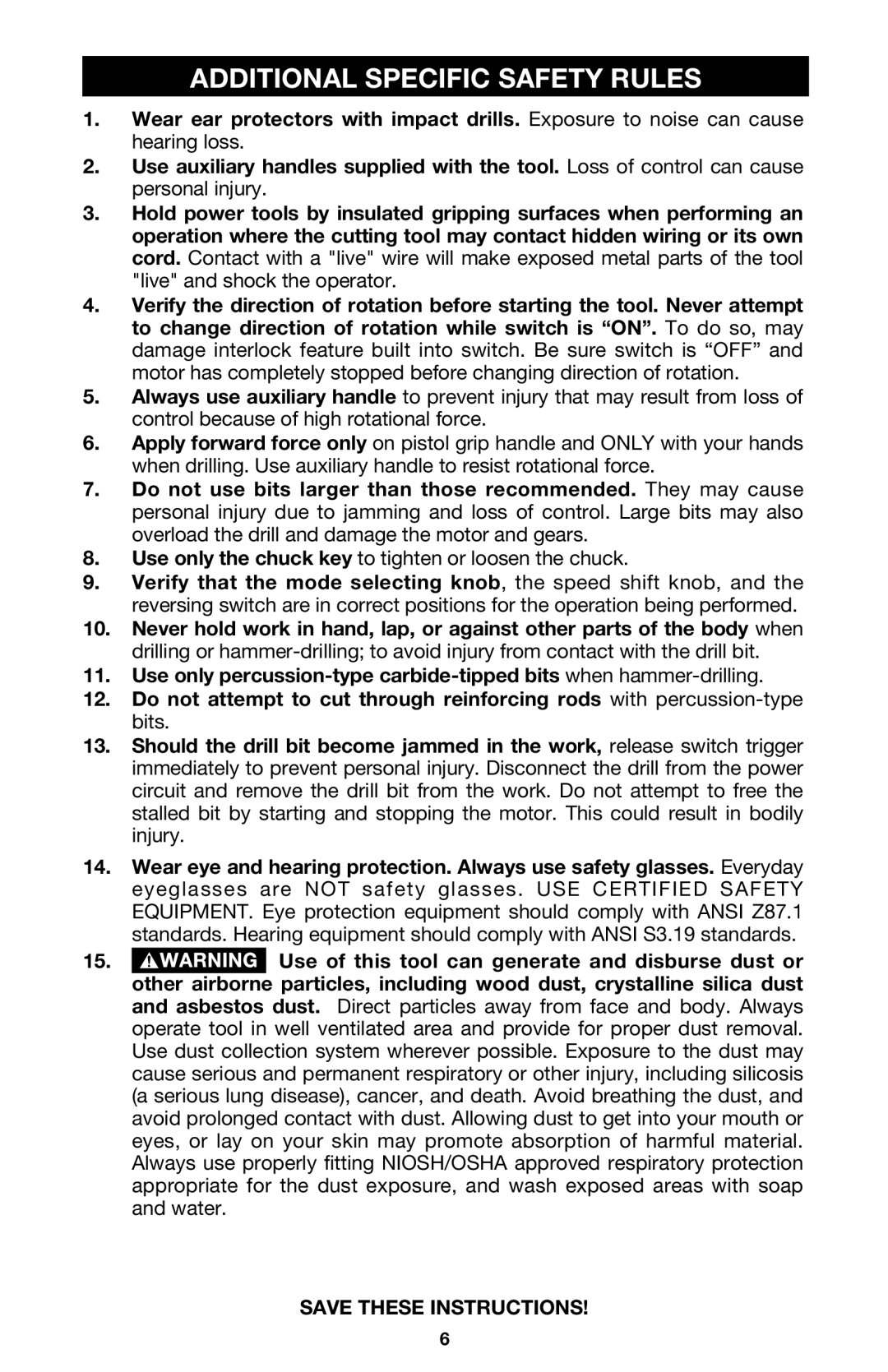ADDITIONAL SPECIFIC SAFETY RULES
1.Wear ear protectors with impact drills. Exposure to noise can cause hearing loss.
2.Use auxiliary handles supplied with the tool. Loss of control can cause personal injury.
3.Hold power tools by insulated gripping surfaces when performing an operation where the cutting tool may contact hidden wiring or its own cord. Contact with a "live" wire will make exposed metal parts of the tool "live" and shock the operator.
4.Verify the direction of rotation before starting the tool. Never attempt to change direction of rotation while switch is “ON”. To do so, may damage interlock feature built into switch. Be sure switch is “OFF” and motor has completely stopped before changing direction of rotation.
5.Always use auxiliary handle to prevent injury that may result from loss of control because of high rotational force.
6.Apply forward force only on pistol grip handle and ONLY with your hands when drilling. Use auxiliary handle to resist rotational force.
7.Do not use bits larger than those recommended. They may cause personal injury due to jamming and loss of control. Large bits may also overload the drill and damage the motor and gears.
8.Use only the chuck key to tighten or loosen the chuck.
9.Verify that the mode selecting knob, the speed shift knob, and the reversing switch are in correct positions for the operation being performed.
10.Never hold work in hand, lap, or against other parts of the body when drilling or
11.Use only
12.Do not attempt to cut through reinforcing rods with
13.Should the drill bit become jammed in the work, release switch trigger immediately to prevent personal injury. Disconnect the drill from the power circuit and remove the drill bit from the work. Do not attempt to free the stalled bit by starting and stopping the motor. This could result in bodily injury.
14.Wear eye and hearing protection. Always use safety glasses. Everyday eyeglasses are NOT safety glasses. USE CERTIFIED SAFETY EQUIPMENT. Eye protection equipment should comply with ANSI Z87.1 standards. Hearing equipment should comply with ANSI S3.19 standards.
15.![]() Use of this tool can generate and disburse dust or other airborne particles, including wood dust, crystalline silica dust and asbestos dust. Direct particles away from face and body. Always operate tool in well ventilated area and provide for proper dust removal. Use dust collection system wherever possible. Exposure to the dust may cause serious and permanent respiratory or other injury, including silicosis (a serious lung disease), cancer, and death. Avoid breathing the dust, and avoid prolonged contact with dust. Allowing dust to get into your mouth or eyes, or lay on your skin may promote absorption of harmful material. Always use properly fitting NIOSH/OSHA approved respiratory protection appropriate for the dust exposure, and wash exposed areas with soap and water.
Use of this tool can generate and disburse dust or other airborne particles, including wood dust, crystalline silica dust and asbestos dust. Direct particles away from face and body. Always operate tool in well ventilated area and provide for proper dust removal. Use dust collection system wherever possible. Exposure to the dust may cause serious and permanent respiratory or other injury, including silicosis (a serious lung disease), cancer, and death. Avoid breathing the dust, and avoid prolonged contact with dust. Allowing dust to get into your mouth or eyes, or lay on your skin may promote absorption of harmful material. Always use properly fitting NIOSH/OSHA approved respiratory protection appropriate for the dust exposure, and wash exposed areas with soap and water.
SAVE THESE INSTRUCTIONS!
6
